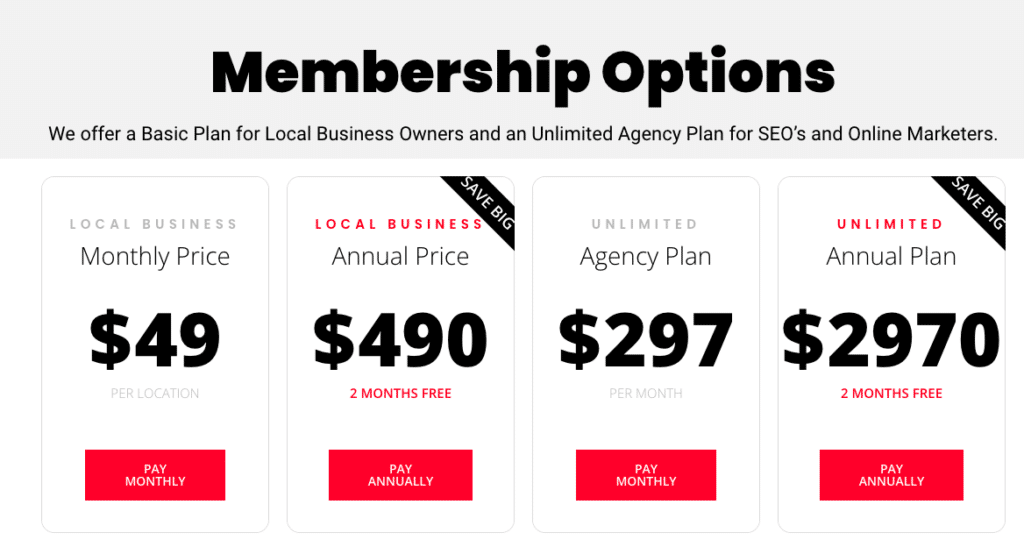Tactics for Marketing Local Businesses

Marketing plays a crucial role in the success of any business, and this is especially true for local businesses. With the rise of online platforms and the increasing competition in the local market, it is essential for local businesses to adopt effective marketing tactics to stand out from the crowd and attract customers. In this article, we will explore some proven tactics for marketing local businesses, backed by research, examples, and case studies.
Get your FREE 14 DAY TRIAL for over 300 local citations. Click below!

1. Optimize your online presence
In today’s digital age, having a strong online presence is vital for local businesses. Here are some tactics to optimize your online presence:
- Create a professional website: A well-designed and user-friendly website is the foundation of your online presence. It should provide essential information about your business, such as contact details, services offered, and customer testimonials.
- Utilize search engine optimization (SEO): Implementing SEO techniques can help your website rank higher in search engine results, making it easier for potential customers to find you. Focus on local keywords and include location-specific information on your website.
- Claim and optimize your Google My Business listing: Google My Business is a powerful tool for local businesses. Claiming and optimizing your listing can improve your visibility in local search results and provide valuable information to potential customers.
- Encourage online reviews: Positive online reviews can significantly impact a local business’s reputation and attract new customers. Encourage satisfied customers to leave reviews on platforms like Google, Yelp, and Facebook.
2. Leverage social media marketing
Social media platforms offer a cost-effective way for local businesses to reach their target audience and build brand awareness. Here are some tactics to leverage social media marketing:
- Identify the right platforms: Research your target audience to determine which social media platforms they are most active on. Focus your efforts on those platforms to maximize your reach.
- Create engaging content: Develop a content strategy that aligns with your target audience’s interests and needs. Share informative and entertaining content that showcases your expertise and encourages engagement.
- Run targeted ads: Social media platforms provide powerful targeting options that allow you to reach specific demographics and locations. Invest in targeted ads to increase your visibility and attract potential customers.
- Engage with your audience: Respond to comments, messages, and reviews promptly. Engaging with your audience shows that you value their feedback and builds trust.
3. Collaborate with local influencers
Influencer marketing has gained significant traction in recent years, and collaborating with local influencers can be a game-changer for local businesses. Here’s how you can leverage influencer marketing:
- Identify relevant local influencers: Look for influencers in your niche who have a significant following in your local area. Their endorsement can help you reach a wider audience and build credibility.
- Offer incentives: Provide influencers with incentives, such as free products or services, in exchange for promoting your business. This can be an effective way to generate buzz and attract new customers.
- Create engaging content together: Collaborate with influencers to create content that showcases your products or services. This can include sponsored blog posts, social media posts, or videos.
- Track and measure results: Monitor the performance of your influencer campaigns to determine their effectiveness. Track metrics such as website traffic, social media engagement, and sales to assess the ROI of your collaborations.
4. Implement local SEO strategies
Local search engine optimization (SEO) focuses on optimizing your online presence to rank higher in local search results. Here are some tactics to implement local SEO strategies:
- Optimize your website for local keywords: Conduct keyword research to identify relevant local keywords that potential customers might use to find businesses like yours. Incorporate these keywords into your website’s content, meta tags, and headings.
- Create location-specific landing pages: If your business serves multiple locations, create dedicated landing pages for each location. Include location-specific information, testimonials, and contact details to improve your chances of ranking in local search results.
- Build local citations: Local citations are online mentions of your business’s name, address, and phone number (NAP). They play a crucial role in local SEO. Consider using a service like Citation Vault, which automates 300 local citations for any business, to ensure consistency and accuracy across various online directories.
- Optimize your Google My Business listing: In addition to claiming and optimizing your Google My Business listing, regularly update it with relevant information, such as business hours, photos, and special offers. Encourage customers to leave reviews on your listing.
5. Offer exceptional customer service
Providing exceptional customer service is one of the most effective marketing tactics for local businesses. Happy customers are more likely to recommend your business to others, leading to word-of-mouth referrals. Here’s how you can offer exceptional customer service:
- Train your staff: Invest in training programs to ensure your staff is knowledgeable, friendly, and capable of providing excellent customer service.
- Personalize the customer experience: Get to know your customers and personalize their experience whenever possible. Remember their names, preferences, and past interactions to make them feel valued.
- Respond to customer feedback: Actively listen to customer feedback and address any concerns or issues promptly. Show your customers that their opinions matter and that you are committed to their satisfaction.
- Go the extra mile: Surprise and delight your customers by going above and beyond their expectations. Offer small gestures, such as handwritten thank-you notes or personalized recommendations, to leave a lasting impression.
Summary
Marketing local businesses requires a strategic approach that takes advantage of online platforms, social media, influencer collaborations, local SEO, and exceptional customer service. By optimizing your online presence, leveraging social media marketing, collaborating with local influencers, implementing local SEO strategies, and offering exceptional customer service, you can effectively market your local business and attract a steady stream of customers. Remember to track and measure the results of your marketing efforts to refine your strategies and achieve long-term success.
Remember, for consistent and accurate local citations, consider using Citation Vault – a local citation service that automates 300 local citations for any business.
Frequently Asked Questions

1. How can I leverage local events to market my business more effectively?
Local events offer an excellent opportunity for community engagement and can serve as a powerful marketing platform for local businesses.
Sponsorship and Participation: Sponsor local events or participate in community fairs and festivals to increase brand visibility.
Hosting Your Own Events: Create and host your own events, such as workshops, open houses, or charity drives, to draw people to your business.
Cross-Promotion: Collaborate with event organizers and other local businesses to cross-promote each other’s services.
Social Media and Local Press: Utilize local media and social media to promote your involvement in local events.
Follow-Up: After events, follow up with attendees through email or social media to build long-term relationships.
By embedding your business within the local events scene, you increase not just visibility but also community goodwill, which is invaluable for local business marketing.
2. What role do local SEO strategies play in marketing my business, and how can I optimize my presence?
Local SEO is critical in ensuring that your business appears in search results when potential customers are looking for services or products in your area.
Google My Business Optimization: Ensure your Google My Business profile is complete, accurate, and optimized for your target keywords.
Local Keywords: Use local keywords on your website and in your content strategy to improve local search rankings.
Mobile Optimization: Ensure your website is mobile-friendly, as a significant portion of local searches occur on mobile devices.
Local Backlinks: Build local backlinks by getting listed in local directories, joining local chambers, and engaging with local bloggers.
Schema Markup: Use local business schema markup on your website to help search engines understand and display your location information.
Effective local SEO strategies help to place your business in front of local customers right at the moment they are looking for your products or services.
3. How can I utilize local influencers to market my business, and what should I look for in a local influencer partnership?
Local influencers can have a strong sway in community preferences and can be leveraged to extend your reach.
Identify Influencers: Look for local influencers who align with your brand values and have a genuine following.
Partnership Strategy: Develop a partnership strategy that is mutually beneficial. This could include sponsored content, reviews, or social media mentions.
Authenticity: Ensure any influencer content is authentic and resonates with both your brand and the local audience.
Track Results: Use unique promo codes or referral links to track the impact of influencer partnerships on your business.
Influencers can be a conduit for trust and can introduce your business to a broader local audience in a more personal and direct manner.
4. What marketing tactics can I employ to capitalize on local print and broadcast media?
Traditional local media, such as newspapers and local radio, can still be very effective, especially in certain demographics or regions.
Press Releases: Send out press releases to local newspapers, magazines, and radio stations to announce newsworthy events or offerings.
Local Advertisements: Consider investing in local ad spots in print media and on the radio, particularly in media outlets that cater to your target market.
Media Relationships: Build relationships with local media representatives, which can increase your chances of coverage.
Community Involvement: Get involved in community issues that align with your business’s values to gain positive media attention.
Local Stories: Create story angles that appeal to local media, such as local success stories or your involvement in solving local problems.
Local media can significantly boost your business’s profile and credibility within the community.
5. Can loyalty programs and local partnerships enhance my local business marketing, and if so, how?
Loyalty programs and local partnerships can create a strong local network that promotes customer retention and referrals.
Loyalty Programs: Introduce a loyalty program that rewards repeat customers and encourages word-of-mouth marketing.
Partnership Benefits: Partner with other local businesses to offer reciprocal discounts or benefits to each other’s customers.
Local Networking: Join local business networks to build relationships that can lead to referral partnerships.
Community Projects: Engage in community projects with other businesses to raise your profile and demonstrate community commitment.
Joint Events: Host events with other local businesses to pool marketing resources and broaden your customer base.
These strategies can foster a loyal customer base and create a network of local businesses that support and amplify each other’s marketing efforts.
- local business listings
- local canadian citations
- local citations
- Tactics for Marketing Local Businesses






